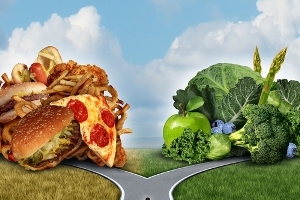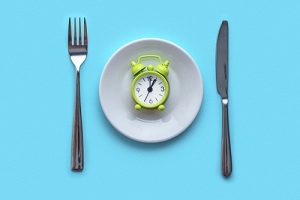7 Weight Loss Motivation Tips That Work
How to stay focused on getting slimmer and staying that way
 "7 Weight Loss Motivation Tips That Work" courtesy of Foxtongue
"7 Weight Loss Motivation Tips That Work" courtesy of FoxtongueThe phone call was desperate, the voice pleading: "I'm afraid I'm going to be a great fat blob on my wedding day! Can you help me?"
She came to see me. Sheila was her name: "It's always the same. I get motivated for a few weeks, lose weight, then something happens and I pile it all on again and more! I'm getting married in three months! You'd think that would be motivation enough but my weight's been even more all over the place lately!"
Sheila was right. Weight loss motivation is easy...at first. Rapid progress, compliments, wearing the clothes you really want to, feeling more attractive, more energy. All this positive feedback is motivating, captivating. But inevitably this weight loss 'honeymoon period' wanes. And that's when it can get tough.
How do slim people do it?
Living like a slim person needs to be a way of life. If a healthy weight can only be sustained through constant positive feedback and the excitement of feeling newly slimmer then it won't be sustainable long term.
"What do you mean: "Something happens"? I asked Sheila.
"Well I might have an upset at work, or my son will wind me up or I'll start worrying about being fat at my wedding!" Ah, so Sheila was doing what millions of people who struggle with their weight do. She was using food for emotional support as well as simply nutrition.
Our goal was simple. We needed her to start thinking and behaving like a slim person long term up to and beyond her wedding. Here are some approaches we used and you can really 'make them your own' so they work for you :)
1) Natural weight loss motivation means thinking slim.
Think about this: What do you experience just before you eat something? That all important moment.
Do you wrestle with yourself? "I really shouldn't but I want to!" Do you imagine how it's going to taste, feel in the mouth? The texture and taste? Or do you focus on the real consequences not just the transitory satisfactions of eating.
Overweight people tend to imagine how it's going to taste and feel as they eat, whereas people who naturally 'eat slim' tend to imagine how all that stodgy pie or cake will feel hanging heavy in their stomachs after they've eaten it.
Jumping from a great height may feel fun whilst it lasts but the consequences come after we hit the ground and it's that which we consider when deciding not to do it.
So practice the habit (until it becomes natural for you) of imagining, when your being tempted to eat what you don't need, how your stomach is going to feel ten minutes or an hour after you've consumed weight increasing food.
2) Hang out with slim people.
I'm not suggesting you ditch all your less-than-slender friends but research has shown that the body type of the average person you hang out with affects your weight and size. (1)
So start hanging around (perhaps at the gym) with slimmer, fitter types and you'll start feeding your subconscious mind the message of what is 'normal'. Sheila started hanging out with slim types at a jogging club and socialized with some of them too.
3) Lasting weight loss motivation: Be fair to yourself.
Imagine a friend of yours walk up a hundred steps but, feels a bit tired. They stop and step back down one step. They tell you bitterly: "I've totally blown it! I may as well forget this whole idea of reaching the top!" What?! You'd think that was crazy right? As if all that other progress, the 99 steps they have climbed, never happened. Because they had one slip! But that's exactly what people do with weight loss.
You lose weight, maybe three or four pounds maybe much more. But you slip, have a bad day, or a "weak moment" and you eat something you shouldn't have. And what do you tell yourself? 'Now I've completely blown it!' I might as well really binge!
Beware the trap of perfectionism - aim to eat sensibly and healthily most of the time not all the time. Don't live under a self imposed dictatorship.
We all eat more than we should of the wrong kind of stuff now and then. Think of your weight as something that (once you've reached a healthy weight) can go up and down to some extent.
Have a 'sliding scale' in your mind of a couple of pounds either side your target weight. Everyone's weight fluctuates a bit and you should prepare for this. No one can live for long under a self imposed too harsh dictatorship.
4) Change what 'treats' mean to you.
Brainwashed: that's what we are. From childhood on it's drummed into (some of) us that "treats" consist of fatty, sugary empty calorific stodge.
So what happens next? We start eating healthily and suddenly we have no treats. We feel deprived.
Of course a treat is whatever you decide is a treat. Is it really a treat to clog arteries, add unsightly fat, feel bad about yourself, risk diabetes and heart disease?
Write down five treats that don't involve enhancing the fat or sugar. Whether the treat is calling a friend, going for a walk, or even having a cup of special tea or coffee, we can all reward and comfort ourselves. It's how we do it that counts.
5) Weight loss is not a cure-all
Don't expect weight loss to cure all of life's problems. Sure you'll be healthier, fitter and so on, and that will have positive and maybe unexpected positive ripple effects but, as a slimmer person, you'll still have a bad day in the office, moments of self doubt, times when you feel undervalued.
Believe it or not, many people feel let down when they become slimmer and then find that being slim doesn't solve all their problems in one go and so revert to eating poorly again. Don't fall into this trap. You have lots of different needs which need to be fulfilled in life. Being slimmer, healthier and fitter is just one of them.
6) Let your digestion take time out
Sure you'll get slimmer but this will be a happy by-product of becoming generally healthier. A way to increase your weight loss motivation is to think of times of not eating as a treat, a rest, a recuperation, or 'time out' for your digestion. You need to eat enough of the right kinds of food but snacking when you're not hungry is making your system work much harder.
Imagine an office worker having to process important paper work. To be effective they need to have regular breaks. Now imagine overloading them with loads of useless unnecessary admin (that doesn't need doing at all). To fulfil their real role they need to just process what needs to be processed and enjoy having enough breaks to do their job well. It's the same for your stomach.
Stomachs get exhausted having to constantly process loads of unnecessary bulky foods. Treat your stomach by giving it time off.
7) Eat when you are hungry
This sounds obvious but eating sugary foods will cause a subsequent crash in energy leaving you wanting more sweetness. Eating protein and fat with every meal help sustain slow release energy. This avoids the "crash and burn" of overdosing on the sugar or processed carbohydrates.
Eating for slow release energy release is a sustainable way to keep you weight loss motivation firing on all cylinders without you having to consciously think about it.
It's over six years since Sheila walked down the aisle. I still see her at my gym sometimes. The happiest day of her life was so happy, she tells me, because she felt so healthy and the fact that she was slim was (and is) just a happy outer reflection of the changes in the way she feels and thinks about food.
Get a free hypnosis session with our new Weight Loss app for iOS & Android
Includes our most popular weight loss session free, with the option to upgrade to 10 more sessions.
Get the Weight Loss Hypnosis app for iOS (iPhone or iPad) here or for Android here.
References
- Having an obese friend dramatically increases the risk of becoming similarly fat, according to a study. Obesity is "socially contagious", spreading from person to person in a social network, researchers said. The study, published in the New England Journal of Medicine, found that if one person becomes obese, those closely connected to them have a greater chance of becoming obese themselves. Surprisingly, the greatest effect was seen not among people sharing the same genes or household but among friends.








